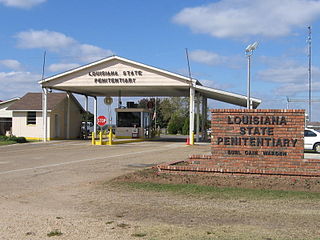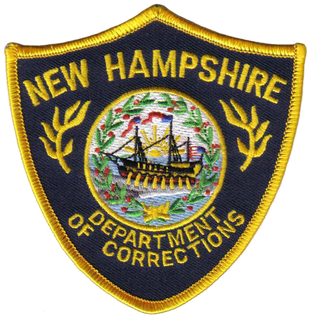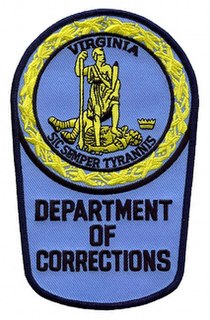Related Research Articles

Parole is the early release of a prisoner who agrees to abide by certain conditions, originating from the French word parole. The term became associated during the Middle Ages with the release of prisoners who gave their word.

The Mississippi Department of Corrections (MDOC) is a state agency of Mississippi that operates prisons. It has its headquarters in Jackson. As of 2020 Burl Cain is the commissioner.

The Kansas Department of Corrections is a cabinet-level agency of Kansas that operates the state's correctional facilities, both juvenile and adult; the state's parole system; and the state's Prisoner Review Board. It is headquartered in Topeka.
Probation in criminal law is a period of supervision over an offender, ordered by the court instead of serving time in prison.

Capital punishment is a legal penalty in the U.S. state of Louisiana.
The Adult Diagnostic and Treatment Center (ADTC) is a secure correctional facility operated by the New Jersey Department of Corrections. Its purpose is to provide treatment and incarceration for certain criteria meeting repetitive and compulsive male sex offenders who have been sentenced under the New Jersey Sex Offender Act.

The California Department of Corrections and Rehabilitation (CDCR) is the agency of the government of California responsible for the operation of the California state prison and parole systems. Its headquarters are in Sacramento.

Capital punishment is a legal penalty in the state of Texas, part of the United States.

The Tennessee Department of Correction (TDOC) is a Cabinet-level agency within the Tennessee state government responsible for the oversight of more than 20,000 convicted offenders in Tennessee's fourteen prisons, three of which are privately managed by the Corrections Corporation of America. The department is headed by the Tennessee Commissioner of Correction, who is currently Tony Parker. TDOC facilities' medical and mental health services are provided by Corizon. Juvenile offenders not sentenced as adults are supervised by the independent Tennessee Department of Children's Services, while inmates granted parole or sentenced to probation are overseen by the Department of Correction (TDOC)/Department of Parole. The agency is fully accredited by the American Correctional Association. The department has its headquarters on the sixth floor of the Rachel Jackson Building in Nashville.

The New Hampshire Department of Corrections is an executive agency of the U.S. state of New Hampshire; charged with overseeing the state correctional facilities, supervising probation and parolees, and serving in an advisory capacity in the prevention of crime and delinquency. As of June 30, 2013, the Department had an inmate population of 2,791, 15,267 on probation or parole, and 893 total employees, 470 as corrections officers and 64 as probation/parole officers. The agency has its headquarters in Concord.

The Virginia Department of Corrections (VADOC) is the government agency responsible for community corrections and operating prisons and correctional facilities in the Commonwealth of Virginia in the United States. The agency is fully accredited by the American Correctional Association and is one of the oldest functioning correctional agencies in the United States. Its headquarters is located in the state capital of Richmond.

The New York State Department of Corrections and Community Supervision (NYSDOCCS) is the department of the New York State government responsible for the care, confinement, and rehabilitation of inmates.

The New Jersey Department of Corrections (NJDOC) is responsible for operations and management of prison facilities in the U.S. state of New Jersey. The department operates 13 major institutions—seven adult male correctional facilities, three youth facilities, one facility for sex offenders, one women's correctional institution and a central reception / intake unit—and a Stabilization and Reintegration Program. The department is headquartered in Trenton.

The Utah Department of Corrections (UDC) is a government agency dedicated to the management and supervision of convicted felons in the U.S. state of Utah. It is currently led by the Executive Director Mike Haddon. It has its headquarters in the Utah Department of Corrections Administration Building in Draper.

The Texas Department of Criminal Justice (TDCJ) is a department of the government of the U.S. state of Texas. The TDCJ is responsible for statewide criminal justice for adult offenders, including managing offenders in state prisons, state jails, and private correctional facilities, funding and certain oversight of community supervision, and supervision of offenders released from prison on parole or mandatory supervision. The TDCJ operates the largest prison system in the United States.

Opened in 1969, Georgia Diagnostic and Classification Prison (GDCP) is a Georgia Department of Corrections prison for men in unincorporated Butts County, Georgia, near Jackson. The prison holds the state execution chamber. The execution equipment was moved to the prison in June 1980, with the first execution in the facility occurring on December 15, 1983. The prison houses the male death row, while female death row inmates reside in Arrendale State Prison.

The Department of Public Safety and Corrections (DPS&C) is a state agency of Louisiana, headquartered in Baton Rouge. The agency comprises two major areas: Public Safety Services and Corrections Services. The Secretary, who is appointed by the Governor, serves as the department's chief executive officer. The Corrections Services Deputy Secretary, Undersecretary, and Assistant Secretaries for the Office of Adult Services and the Office of Youth Development report directly to the Secretary. Headquarters Administration consists of centralized Divisions that support the management and operations of the adult and juvenile institutions, adult and juvenile probation and parole district offices, and all other services provided by the department.

The New York State Division of Parole is an agency of the government of New York within the New York State Correctional Services § 259. "1. There shall be in the executive department of state government a state division of parole" responsible for parole, the supervised release of a prisoner before the completion of his/her sentence.

The Idaho Department of Correction (IDOC) operates nine prisons, four community release centers and 20 probation and parole offices in seven districts located throughout the state of Idaho. The agency has its headquarters in Boise.
The New Zealand Parole Board is an independent statutory body established in 2002 that considers offenders for parole. Its task "is to undertake an assessment of the risk that long-term sentenced offenders might pose to the safety of the community if they were to be released before the end of their sentence". The Board also sets conditions of release for offenders so their reintegration back in to the community can be effectively managed. Once the conditions are set it becomes the responsibility of Community Corrections to manage the offender." 'Long term' is defined as more than 24 months. Short-term prisoners are automatically released after serving half their sentence.
References
- 1 2 Lindsey, Daryl (December 3, 1997). "Web Watchers Track, Trip Up Parolees". Wired. Retrieved 2011-01-23.
- 1 2 3 Mendels, Pamela (April 17, 1997). "New York Group Planning to Use Web Site To Notify Public on Felons' Parole Status". The New York Times.
- ↑ Diamond, Joe (Winter 1998). "Keeping America's "Most Unwanted" Behind Bars" (PDF). Klaas Action Review. KlaasKids Foundation. p. 3. Archived from the original (PDF) on 2010-12-16. Retrieved 2011-01-30.
- ↑ New York Post editorial board (1997-12-23). "Don't Parole Joel". New York Post.
- ↑ Shapiro, Andrew (1999). The Control Revolution: How the Internet is Putting Individuals in Charge and Changing the World We Know . New York: PublicAffairs. pp. 150–153.
- ↑ Richtel, Matt (August 26, 1997). "Scans: Scarlet Letters from Cyberspace". Wired. Archived from the original on November 6, 2012. Retrieved 2017-04-28.
- ↑ Fenner, Austin (February 23, 1998). "Web used to monitor those up for parole". Daily News. New York.